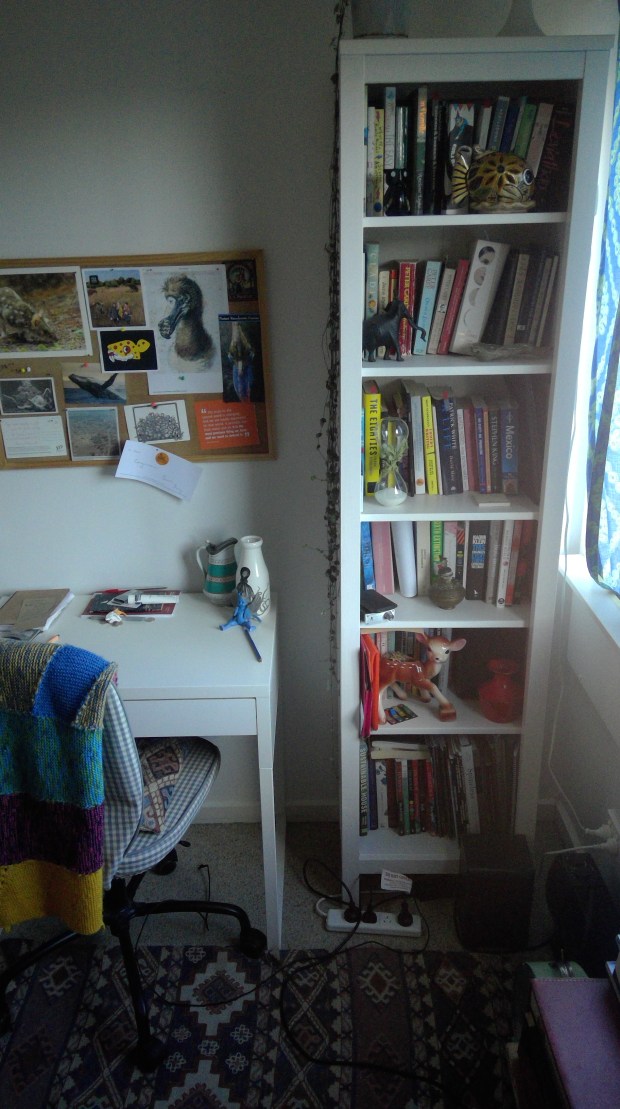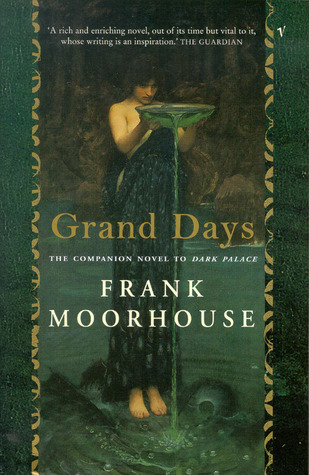
Author Jane Rawson.
Melbourne-based Jane Rawson’s new novel, From the Wreck, is both historical and speculative fiction, and unlike anything I’ve ever read before. Its unique premise combines a fictionalised account of the life story of her ancestor George Hills – who survived a shipwreck off the South Australian coast in 1859 – with that of an ethereal alien being, seeking refuge on Earth from another dimension.
The prose is, quite simply, breathtaking, with language used in innovative, sometimes startling and often visceral ways. It’s so good, in fact, that I ACTUALLY FOLDED OVER SEVERAL PAGES to mark significant or particularly beautiful passages.

Jane’s day job is in a communications role for the Victorian government. She’s a former travel writer, with her work appearing in Lonely Planet guides and other publications, and the co-author (with James Whitmore) of The Handbook: surviving and living with climate change. Jane describes her previously published novella, Formaldehyde, as “an adorable little book about arm transplants and bureaucracy”, and fellow Melbourne author Steven Amsterdam describes her first novel, A Wrong Turn at the Office of Unmade Lists, as a “free-range and funny apocalyptic time-space road trip”.
I was incredibly fortunate to interview Jane for Good Reading magazine, ahead of the release this month of From the Wreck, and I was captivated for every minute of our hour-long conversation.
Jane has the sort of dry, self-deprecating humour that I particularly enjoy. She is smart as a whip, widely read, and modestly brushed aside my compliments about her writing. She graciously agreed to answer my ten questions for a guest post in the Shelf Aware series. I’m confident you’ll find her responses as entertaining as I did.
Q. How would you describe what you do and how you do it?
A. I’m a reader and a thinker and sometimes I get obsessed enough with an idea that I’m also a writer. Those ideas get written (sometimes multiple times) into short stories, novels and non-fiction, depending on how I feel.
Q. What projects are you currently working on or do you have in the pipeline?
A. The ideas that I’m fixated on at the moment are about extinction and about wild animals and how few of them are left – some of this is a continuation of ideas I was fixated on while writing From the Wreck. I’m collecting piles of information and thoughts that might turn into a novel or might turn into a long essay. They might also turn into nothing.
Meanwhile, I’m working on a project with my sister-in-law, who has made a series of beautiful and disturbing prints of alternative gods: I’m trying to write stories to accompany them.
Q. Where are the main bookcases in your home or office? Do you also keep books in other places at home (or elsewhere)?
A. I have three bookcases at home – one in the bedroom, one in the spare bedroom (which is also my writing room) and one in the lounge room. There are books on the floor next to my bed, on the night stand, on the kitchen table and in all my various handbags and backpacks.
 There’s no more space for books on my bookcases or bookcases in my house so I try to mostly borrow library books and stick to a ‘one-in-one-out’ policy – I can only buy a new book if I give an old one away. I fail nearly every day.
There’s no more space for books on my bookcases or bookcases in my house so I try to mostly borrow library books and stick to a ‘one-in-one-out’ policy – I can only buy a new book if I give an old one away. I fail nearly every day.
Q.How are your books organised/arranged?
A. I did once file my books by colour but I couldn’t find anything anymore so I went back to the much more conventional alphabetical order by author. Fiction and non-fiction are separated and non-fiction is clumped into a few not-very-specific groups.
Q. What sorts of books predominate?
A. Most of my books are fiction, and most of those are ‘literary fiction’ novels. But I also read stories, experimental fiction, speculative fiction and a little bit of crime, or anything else that takes my fancy. I have a poetry shelf and it’s almost entirely for show – beautiful volumes, entirely unread. I like books about science and the environment; I like books about Australian history; I like graphic novels and books about or full of photography.
Q. Describe your favourite reading place.
A. In bed at 6am, drinking a cup of tea and procrastinating from getting up and going to work. At a bar with a dirty martini, particularly when no one knows where I am. On the couch when I should be grocery shopping. On the train to work, when I forget I’m on the train to work.
Q. What book/s are you reading right now? Why did you choose that book/those books and what do you think of it/them so far?
A. I’ve just been in Mexico for a month and my reading habit is much disturbed. I started The Revolutionaries Try Again, by Mauro Javier Cardenas, and I started A Zero-Sum Game by Eduardo Rabasa, and I started Sidewalks by Valeria Luiselli – all Latin American books I thought it would be good to read while I was away – and I stopped all of them.

Theoretically I am reading them right now. Really I am reading Griffith Review’s new State of Hope edition about South Australia, because I have a story in it and they sent me a free copy. I’m loving it! The essays and stories are extremely well chosen, and I’ve fallen a bit in love with South Australia. I almost want to move to Adelaide.
Q. What are your favourite books and/or who are your favourite authors?
A. The book I have read the most times is Alive: The Story of the Andes survivors, by Piers Paul Read – it’s not a great book but I was obsessed by the tragic story of doomed young Latin American rugby players when I was 13 and I read it over and over and over. I think it kicked off my general fascination with Latin America, which I later claimed was based on a deep affinity with revolutionary politics. What a liar.
But that’s probably not what you mean. Books I have loved most recently are Ali Smith’s How to Be Both, Kevin Barry’s Beatlebone, The Solar Bones, by Mike McCormack, and Their Brilliant Careers, by Ryan O’Neill.
Q. In the event of an emergency, if you could save just three books from your collection, which books would they be – and why would you choose them?
A. Honestly, I don’t think I would save any. I’m not that into books as objects or talismans, and in some ways it would be a huge weight removed if all my books disappeared. My to-read pile is stupidly big and a little anxiety-inducing. As long as the library always existed I think I’d be OK not to own books anymore. Remind me of this if you find me weeping in the street after a catastrophic fire.
Q. If you could sit down for afternoon tea with your three favourite characters or authors, who would they be, what would you serve them, and what would like to talk to them about?
A. I would invite Edith Campbell Berry, of Frank Moorhouse’s Grand Days trilogy, and no one else. I prefer talking one-on-one and anyway, I don’t want to share her. I’d serve her manchego cheese, roasted almonds, honey and slices of green apple, as well as some small slices of halva and nougat. She could choose from a very good dry sherry, sparkling wine or a martini (or all three: whatever she wants). We would talk about the public service, and also frocks, and maintaining decorum under the influence of alcohol.
From the Wreck, by Jane Rawson, is published by Transit Lounge. RRP $29.95.
Find out more about Jane:
#janerawson #fromthewreck #transitelounge #speculativefiction #historicalfiction #australianauthor #formaldehyde #australianwomenauthors #awrongturnattheofficeofunmadelists #climatechange #thehandbook















I really enjoyed this interview. Jane’s answers were unexpected, and despite owning a lot of books her comment that she doesn’t see books as objects or talismans resonated with me. I liked her attempt at a ‘one-in-one-out’ policy. I might have to adopt that one myself… Nah. That would just be setting myself up for failure!
Thanks for the interesting read Maureen & Jane!
LikeLiked by 1 person
Thanks Marie. I was delighted with the warmth and wit of Jane’s responses. I also may have thought about what it might be like to take a “one in, one out” approach to avoiding overflowing book shelves, but knew I was a lost cause!
LikeLiked by 1 person
Sparkling interview, Jane and Maureen! Jane’s wit comes through even in this brief exchange. I’m always envious of anyone who catches a train to work, because they’re forced to read for the duration of the journey. When I worked in London, I had a 90-minute journey each way—I’ve never read so much before or since! It was bliss—missed my stop a few times, and it was mostly accidental. 😉
LikeLiked by 1 person
Ditto. I had a TERRIBLe job for a year in Melbourne but I travelled an hour each way on the train and I read more than 100 books that year. Silver lining
LikeLiked by 2 people
I often wish I had a job in the heart of the CBD for two or three days a week, so I could catch the train and read all the way there, and all the way home. Unfortunately, reading while I’m a passenger in a car or bus doesn’t work for me (and listening to audio books while driving tends to lull me into a soporific state, so that’s a no-go too)…
LikeLiked by 1 person
Glad you enjoyed it, Louise. I just went back and read Jane’s responses again, and she’s still making me laugh and smile. Her new book is brilliant — unusual, compelling and beautifully crafted.
LikeLiked by 1 person
‘We would talk about the public service, and also frocks, and maintaining decorum under the influence of alcohol’ I don’t care if you prefer one-on-one Jane, I am totally gatecrashing this party!
LikeLiked by 1 person
I’d be happy to be there, too, Annabel. Doesn’t Jane paint an appealing picture with words?
LikeLiked by 1 person
Annabel, you’re allowed to come.
LikeLike